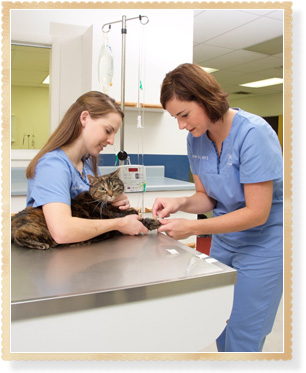Just as in human medicine, preventive
health care is an important part of caring for a family pet. “The value of preventive care and early
intervention in human and dental medicine has been well established and is
acknowledged by the general public” (Journal).
This is actually especially true for pet owners because Muffy and Rover
cannot tell us when they start to feel unwell, so having them see a
veterinarian at least once a year, especially as they reach their senior years,
becomes extremely important.
People
often underestimate the power of preventive medicine for their cat or dog
feeling, perhaps, that it costs too much money.
However, preventive care can decrease “the prevalence of some common
preventable canine and feline diseases that (have) recently been reported. These include diabetes mellitus, dental
disease, parasitism, and otitis externa” (Journal). Routine visits – and by that we mean at least
annually – can find these problems before they become difficult to treat, which
generally makes them more expensive to treat as well. Early disease typically requires fewer
medications and possibly only a diet change, whereas acute, advanced disease
can require hospitalization and multiple medications to treat. This can mean more expense and possibly an
inability to correct the problem. “It
has been shown that early diagnosis and treatment, the principal benefits of
regular examinations, can dramatically slow progression of such conditions of
renal disease, osteoarthritis, and periodontal disease” (Journal).
The
American Animal Hospital Association (AAHA) and the American Veterinary Medical
Association have specific recommendations for regular care for all pets. These recommendations include:
·
A
veterinary examination at least annually.
For many pets, more frequent visits may be appropriate (especially if
the animal is considered a senior pet)
·
Annual
heartworm testing (even if on prevention) as well as intestinal parasite
testing
·
Dental
health assessment, with appropriate treatment when necessary (dental cleaning)
·
Year-round
broad spectrum parasite control with efficacy against heartworms, intestinal
parasites, and fleas
·
Annual
vaccinations against diseases such as Rabies, Canine distemper, Canine
parvovirus, Feline panleukopenia virus, Feline herpesvirus-1, and Calicivirus.
·
Early
disease screening tests
There are many
reasons we may hear as to why we don’t see a pet every year, but the fact is
that preventive care can lengthen and enrich the relationship you have with
your pet. It can also prevent undue
suffering your pet may experience from underlying disease that we may only
detect through blood work.
We
know that cats, especially, may be difficult to transport to the vet every
year. This can be stressful for both
owner and pet, but there are also tools that can be utilized to make the
process easier. If you’d like to know more, please feel free to contact
us. If nothing else, we do offer house
calls, and can do almost everything we can do in the clinic right there. Let us know if this is something you might be
interested in.
We
want everyone to have long, enriching, wonderful relationship with their pets, and
that is why we recommend regular examinations and assessments for all of our
patients. It can go a long way to
making all of them happier and healthier.
Citations:
Journal of the
American Veterinary Medical Association. September 1, 2011, Vol. 239, No. 5, Pages 625-629. doi:
10.2460/javma.239.5.625

